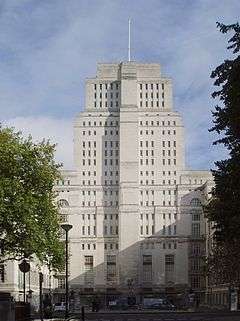Adrian Smith (statistician)
Sir Adrian Frederick Melhuish Smith, FRS (born 9 September 1946)[3] is a British statistician who is Chief Executive of the Alan Turing Institute and President-Elect of the Royal Society [4]
Sir Adrian Smith | |
|---|---|
| Born | Adrian Frederick Melhuish Smith 9 September 1946 |
| Nationality | British |
| Alma mater | University of Cambridge University College London |
| Awards | Guy Medal (Bronze, 1977) (Silver, 1993) (Gold, 2016) |
| Scientific career | |
| Fields | Statistics |
| Institutions | Imperial College London Queen Mary, University of London |
| Doctoral advisor | Dennis Lindley[2] |
| Doctoral students | David Spiegelhalter |
From 1977 until 1990, he was Professor of Statistics and Head of Department of Mathematics at the University of Nottingham. He was previously at Imperial College, London, where he was head of the mathematics department. Smith is a former Deputy Vice-Chancellor of the University of London and became Vice-Chancellor of the university on 1 September 2012.[5] He stood down from the role in August 2018 to become the Director of the Alan Turing Institute.[6]
Smith is a member of the governing body of the London Business School. He served on the Advisory Council for the Office for National Statistics from 1996–1998, was Statistical Advisor to the Nuclear Waste Inspectorate from 1991–1998 and was advisor on Operational Analysis to the Ministry of Defence from 1982–1987.
He is a former President of the Royal Statistical Society. He was elected a Fellow of the Royal Society in 2001. His FRS citation included "his diverse contributions to Bayesian statistics. His monographs are the most comprehensive available and his work has had a major impact on the development of monitoring tools for clinicians."
In statistical theory, Smith is a proponent of Bayesian statistics and evidence-based practice—a general extension of evidence-based medicine into all areas of public policy. With Antonio Machi, he translated Bruno de Finetti's Theory of Probability into English. He wrote an influential paper in 1990 along with Alan E. Gelfand, which drew attention to the significance of the Gibbs sampler technique for Bayesian numerical integration problems. He was also co-author of the seminal paper on the particle filter (Gordon, Salmond and Smith, 1993). Smith was educated at Selwyn College, Cambridge, and University College London where his PhD supervisor was Dennis Lindley.
In mathematics and statistics education, Smith led the team which produced the Smith Report on secondary mathematics education in the United Kingdom.
In April 2008, Smith was appointed as Director General of Science and Research at the Department for Innovation, Universities and Skills (since merged with other departments to form the UK's BEIS). He took up his post in September 2008. His annual remuneration for this role is £160,000.[7]
Smith was knighted in the 2011 New Year Honours.[8]
Honorary doctorates
In 2011, Smith was awarded an Honorary Doctorate of Science from Plymouth University and in 2015, an Honorary Doctorate of Science from The Ohio State University.[9]
Bibliography
- Gelfand, A. E.; Smith, A. F. M. (1990). "Sampling-Based Approaches to Calculating Marginal Densities". Journal of the American Statistical Association. 85 (410): 398–409. doi:10.2307/2289776. JSTOR 2289776.
- N.J. Gordon, D.J. Salmond, and A.F.M. Smith. "Novel Approach to Nonlinear/Non-Gaussian Bayesian State Estimation." IEE Proceedings-F, 140, 107–113, 1993.
- Smith, Adrian (2004). Making Mathematics Count: The Report of Professor Adrian Smith's Inquiry into Post-14 Mathematics Education. London, England: The Stationery Office.
See also
- List of Vice-Chancellors of the University of London
References
- Upton, Graham; Cook, Ian. "Adrian Smith". A Dictionary of Statistics. Oxford University Press.
- Adrian Smith at the Mathematics Genealogy Project
- "Smith, Sir Adrian (Frederick Melhuish)". Who's Who. doi:10.1093/ww/9780199540884.001.0001/ww-9780199540884-e-35225/version/5.
- "Royal Society Announcement".
- "New Vice-Chancellor of the University of London". IQuad. Royal Holloway, University of London. 1 June 2012. Retrieved 31 July 2012.
- "University of London appoints interim Vice-Chancellor". University of London. 8 June 2018. Retrieved 24 December 2018.
- "Top civil servant salary list published". Directgov. 1 June 2010. Archived from the original on 11 June 2011. Retrieved 14 June 2010.
- "No. 59647". The London Gazette (Supplement). 31 December 2010. p. 1.
- https://www.osu.edu/universityawards/dsa/honorary.html
External links
- Making Mathematics Count (Smith report)
- There is a photograph at "Adrian F M Smith" on the Portraits of Statisticians page
| Business positions | ||
|---|---|---|
| Preceded by Geoffrey Crossick |
Director and CEO of Alan Turing Institute 2018–current |
Succeeded by |
| Academic offices | ||
| Preceded by |
Vice-Chancellor of the University of London 2012–2018 |
Succeeded by Peter Kopelman |
| Preceded by |
Deputy Vice-Chancellor of the University of London | Succeeded by |
| Preceded by |
Principal of Queen Mary University of London 1998-2008 |
Succeeded by |
| Government offices | ||
| Preceded by |
Director General for Knowledge and Innovation of Department for Business, Innovation and Skills 2008-2012 |
Succeeded by |
